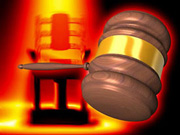| Stop executions for a while and perhaps they can be stopped forever. That calculation has been part of the strategy of capital punishment opponents for decades. The Supreme Court-inspired slowdown in executions offers the first nationwide opportunity in 20-plus years to test whether the absence of regularly scheduled executions will lead some states to abandon the death penalty and change public attitudes about capital punishment. Recent decisions by judges and elected officials have made clear that most executions will not proceed until the Supreme Court rules in a challenge by two death row inmates to the lethal injection procedures used by Kentucky. The inmates say Kentucky's method creates the risk of pain severe enough to be cruel and unusual punishment, banned by the Eighth Amendment. Similar procedures are used by Texas, the far-and-away leader in lethal injections, and the 16 other states that have executed prisoners in the past two years. It is clear the high court will not go so far as to outlaw the use of lethal injections. That issue is not even before the court in the Kentucky case. Rather, the justices could decide whether Kentucky's procedures violate the Constitution and what standard the courts should use to evaluate the risk a prisoner will feel pain as he is put to death. No matter how the court rules, it appears there will be few, if any, prisoners executed before the court rules, probably by late June. "We're probably looking at delaying executions, not preventing them," said Ronald Tabak, a New York-based lawyer with the Skadden Arps firm who has represented death row inmates. Tabak said states with the death penalty now have a chance to review capital punishment procedures. The American Bar Association has for the past 10 years called for such a freeze and review. "The ABA's position is unless you have fair practices, executions should not resume," said Tabak, who has worked with the lawyers' organization on this issue. But Douglas Berman, a sentencing expert at the Ohio State University law school, said the possibility exists for more dramatic action. "The abolitionists will say if we have no executions for six months to a year, and the universe is not imploding and murder rates are not going through the roof ... it becomes easier to say, 'Why do we even need the death penalty, let's just get rid of it,'" Berman said. "Texas and other high-execution states aren't going to get there anytime soon, but the argument against capital punishment gets even more force in those states squeamish about the death penalty in the first instance," Berman said. Questions about the administration of lethal injections are only part of the equation. Death-penalty opponents also have pointed to doubts about the competence of some court-appointed defense lawyers and the rise in the number of exonerations through DNA evidence of people already convicted of crimes. Polling has shown that the public increasingly believes that life in prison without parole will keep the worst offenders off the streets. A recent Associated Presss-Ipsos poll that asked what method of punishment people prefer for murderers found only a slight preference for the death penalty over life in prison — 52 percent to 46 percent. "There is a deeper societal appreciation for life without the possibility of parole. Ten to 15 years ago, no one thought they meant it," Berman said. At the same time, there have been several studies, challenged by the anti-death penalty camp, that have shown a deterrent effect in the use of capital punishment. Also, public support for executions remains high. More than two-thirds of those polled favor the death penalty for murderers when the question does not include other possible punishments. Then there is the example of the last time the country went without executions for an extended period. There were no executions from June 1967 to January 1977. The Supreme Court in 1972 struck down 40 state death penalty laws, but did not ban capital punishment as cruel and unusual. Some justices at the time thought their decision in Furman v. Georgia would bring an end to the death penalty. By 1976, though, in the midst of a "law-and-order" backlash to the court's decisions in favor of the rights of criminal defendants, elected officials in 35 states had adopted laws to comply with the death penalty ruling. A more conservative court upheld some of those laws, and a half-year later executions resumed. |








